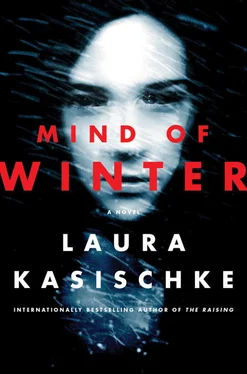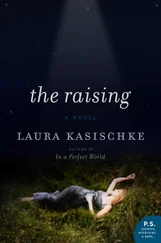Before Tatty could close the bedroom door ( slam the bedroom door) Holly called out, “When I get this cleaned up, we’re going to eat. We’re both cranky!”
The door slammed on the word both.
FOR SEVERAL SECONDS Holly stood still, trying simply to swallow, trying to blink back the tears of frustration and rage that were threatening to fill her eyes. Then she turned to the task at hand, squinting her eyes at the splinters of glass on the floor. She tested the vacuum cleaner to see if the battery was charged, and, miraculously and thankfully, it was. She bent over:
It wasn’t going to be easy to vacuum up all this glass. In fact, Holly was quite sure she never would. For years she would be finding little slivers of it in the cracks between the floorboards. She would find it in the most far-flung corners of the house, where she least expected to find it, long after this accident had been forgotten. A better housekeeper would have a whisk broom, and a dustpan, and would sweep the big pieces into that first. But Holly had no whisk broom. There was a broom—somewhere, surely. Garage? But she didn’t know for sure because she never used it. It was quicker and easier, although perhaps less effective, to vacuum the wooden floors with the upright and, when things accumulated in the corners that couldn’t be reached by the upright, to dash around with this handheld, assuming it was charged. There was something about the broom, motorless and primordial, that never seemed suited to any task Holly set out to do. And now, of course, she associated that broom with Concordia.
Black-haired Concordia, who looked so much more like a mother to Tatiana than Holly herself did. Is that why Tatty had loved her so much? The first time the housekeeper came for her weekly cleaning after they’d brought Baby Tatty home from Russia, Tatty had gasped as Concordia walked in the door with her plastic tote filled with sponges and sprays. Then Baby Tatty had rushed the housekeeper at the speed of light, and thrown her arms around her legs. When Concordia, laughing and speaking in baby-talk Spanish to Tatiana, had crouched down to take the child in her arms, Tatiana had clung to her neck, laughing with a kind of delight that Holly had not yet heard from her. And, after that, Saturdays were Concordia Day, and Tatty would sit near the front door like a loyal puppy waiting for her master, and then she and Concordia would play cleaning games all day.
“Seems like we’re paying her to babysit, not to clean,” Eric had said—not critically, for he loved Concordia, too—while watching the housekeeper chase after Tatiana with a broom, singing a nursery song in Spanish.
And then, the accident. The lawsuit. Their expensive lawyer had fended that off handily, but they’d never seen Concordia again. If she’d left that broom behind, Holly had no idea where it was, and simply thinking of it made her want to sit down among the tiny bits of glass and weep—for herself, for Concordia (whose ankle would never, apparently, properly heal because of the kind of fracture she’d sustained), and, of course, for Tatty.
Holly decided to pick up the big pieces first with her hands—and, naturally, immediately she cut her index finger. A drop of incredibly bright red blood snaked down the finger into the palm of her hand before she could stick the finger in her mouth. It didn’t hurt, and when she looked at it, except for the mess in her palm (it was incredible how bright her blood looked to her in the glare from the picture window), there seemed to be nothing but the most superficial of wounds. A pinprick, really, would have been worse. Holly ignored it and continued to gather up the big shards. She carried a few of those, mixed with a little of her blood, to the garbage can under the sink and tossed them in.
The stem of the water glass had snapped into two nearly equal-sized sections, so Holly picked those up and put them on top of the dining room table. Then she bent over with the handheld and vacuumed up all the tiny bits and the glassy dust that could be seen with the naked eye. Still, those pieces and that dust didn’t, in the end, seem to be nearly enough to have composed an entire water glass before it smashed, so she got back down on her hands and knees and felt around on the floor. A bit of blood from the cut on her finger smeared across the floorboards as she did so—and, indeed, some very finely ground bits of glass stuck to her palms, particularly the bloody one. Finally, Holly sat back on her heels, ran the vacuum over the general area, and then stood up and went to the sink to rinse her hands.
There was only so much she would be able to do.
Again, a better housekeeper would—what?
Well, maybe a better housekeeper would know some method for completing this task, some way to be certain there was no glass left on the floor. A damp microfiber cloth? Duct tape? This was the kind of thing that her sister Janet would have known. But Janet was long gone. Janet was as broken and dispersed as their mother’s water glass by now.
No. For God’s sake, do not think of Janet, today of all days…
It was easier than Holly had thought it would be for one to put people and events out of her mind. Until the few counseling sessions she’d had with Annette Sanders, Holly had thought that the mind had a will of its own, somehow, and ruminated of its own volition. But Annette Sanders had taught her otherwise. She had made Holly wear a rubber band around her wrist, and told her that, every time Janet’s last days or Melissa’s suicide came to mind, Holly was to snap the rubber band and think of something else.
Incredibly, it had worked. All those other therapists who’d tried to help Holly work through the despair and the unconscious sources of all her anguish, to drag them to the surface and observe them in harsh light: Ha! Total wastes of time! What Holly had needed to learn was how to suppress her feelings—something human beings had been doing successfully since the dawn of time, the evidence for which was that they’d managed to get out of bed, eat, procreate, despite death’s unknowable horror potentially and inescapably waiting around every corner. Despite the fact that no one could really be sure that he or she would make it through the day, people did crossword puzzles and dug ditches and flossed their teeth. And, unlike the millions of Americans who needed prescriptions in order to do these things without panic or despair, Holly had been taught to do it with a rubber band!
Of course, she hadn’t been writing poems, either, since Annette Sanders had cured her of—
Of what?
Of grief? Fear? The human condition?
Still, it was worth it, wasn’t it? Rilke might not have thought so ( If my demons leave me, my angels will, too —a quote one of her mentors in graduate school had hauled out every few weeks to warn the student poets—unconscionably?—against the psychotherapy and antidepressants some of them clearly needed), but, Holly felt sure, the cure had nothing to do with her writer’s block anyway. Her writer’s block had to do with how busy and cluttered her life had become with Tatty and Eric in it:
Married life! Family life! Motherhood! Work life! Her writer’s block had to do with how many hours she spent behind the wheel of a car, getting to her office to write her ten million business-manager-memos a day instead of poems, and getting to the grocery store, getting back home, taking care of Tatty and Eric, going to bed to wake up to do it all again the next day. When would she have found time to write, whether she had writer’s block or not?
Perhaps, in fact, writer’s block was a blessing, since her life could certainly not have contained one more activity without shattering into a billion pieces. And Holly didn’t care that (as Eric sometimes shouted at her if she whined too long about having no time to write) some poets had written, and perhaps still wrote, poems on the walls of their jail cells. That some poets were doctors, like William Carlos Williams, or insurance executives, like Wallace Stevens, and absurdly prolific. Sure, freshly written poems had been found in the pockets of the war dead of every war since time immemorial, and Miklós Radnóti wrote his last poems while in a forced labor battalion, despite having to endure beatings by the Nazi guards for it. When the mass grave in which he was buried had been dug up after the war ended, his wife found a book of poems written in pencil in a small Serbian exercise book in his back pocket. The pages had been soaked through with Radnóti’s blood and body fluids, so she had dried them out in the sun.
Читать дальше





![Джон Харгрейв - Mind Hacking [How to Change Your Mind for Good in 21 Days]](/books/404192/dzhon-hargrejv-mind-hacking-how-to-change-your-min-thumb.webp)






